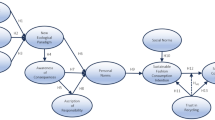Abstract
Recent literature demonstrates that consumers hold an implicit association that sustainable products have lower quality than conventional ones (Luchs et al. 2010; Mai et al. 2017). This research contributes to literature on sustainable consumption by exploring the impact of the use of recycled materials in the fashion industry. Fashion is tied to a human necessity to express both individuality and belongingness (Berger and Heath 2016). Hence, clothing assumes a role of signification through which the consumption of symbolic meanings helps individuals to construct their identity (Firat and Venkatesh 1995). Considering the role of fashion consumption on self-identity, we propose that the moral value of sustainability will uplift product evaluation, increasing quality perceptions and purchase intention. We propose that this positive sustainability-quality association will hold in private consumption contexts when consumption is motivated by the personal identity but not the social identity. In other words, consumers may attribute a higher quality to recycled products to mask the expected spillover of symbolic meanings on self-identity. Therefore, we propose that the positive sustainability-quality reasoning will be stronger when consumers are more prone to use the rational decision-making path to justify their decisions over more sustainable choices (i.e., private consumption). Two studies show the positive sustainability-quality association in fashion consumption. Study 1 demonstrates that participants (n = 97, Mage = 37.1, 51.5% females) inferred a marginally higher quality when a sneaker was made of recycled materials (Mrecycled = 5.32, Mcontrol = 4.99, F(1,95) = 2.84, p < .1). In Study 2, participants (n = 146, Mage = 35.4, 66.4% males) imagined purchasing a jacket made of recycled material (vs. no information) while being alone (vs. among other customers). Results revealed a significant interaction of recycled and consumption context (F(1,107) = 8.79, p < .01) on product quality, morality (F(4,142) = 6.45, p = .012), and purchase intention (F(4,141) = 4.60, p < .05). In the public context, the fact that a product is made of recycled materials did not influence quality, nor purchase intention (all p’s > .05). In the private context, participants attributed higher quality (Mrecycled = 5.0, Mcontrol = 4.3, F(1,142) = 6.91, p < .01) and higher morality to the recycled jacket (Mrecycled = 2.9, Mcontrol = 3.6, F(1,142) = 5.54, p < .02). Participants also reported higher intention to purchase the recycled product (Mrecycled = 3.3, Mcontrol = 2.6, F(1,141) = 4.20, p < .05). Further analysis shows that product morality mediated the impact of recycled materials on quality and purchase intention. In a private consumption context, consumers judged the recycled product as more moral, increasing quality [ab = .436; CI 95%: .095; .798] and purchase intention [ab = .387; CI 95%: .109; .772]. These results support our proposition that the sustainability liability does not hold for fashion products.
Access this chapter
Tax calculation will be finalised at checkout
Purchases are for personal use only
Similar content being viewed by others
Author information
Authors and Affiliations
Corresponding author
Editor information
Editors and Affiliations
Rights and permissions
Copyright information
© 2018 Academy of Marketing Science
About this paper
Cite this paper
Jochims, B., Yamim, A.P., Rossi, P. (2018). All by Myself! The Sustainable Liability on Responsible Fashion: An Abstract. In: Krey, N., Rossi, P. (eds) Boundary Blurred: A Seamless Customer Experience in Virtual and Real Spaces. AMSAC 2018. Developments in Marketing Science: Proceedings of the Academy of Marketing Science. Springer, Cham. https://doi.org/10.1007/978-3-319-99181-8_10
Download citation
DOI: https://doi.org/10.1007/978-3-319-99181-8_10
Published:
Publisher Name: Springer, Cham
Print ISBN: 978-3-319-99180-1
Online ISBN: 978-3-319-99181-8
eBook Packages: Business and ManagementBusiness and Management (R0)




